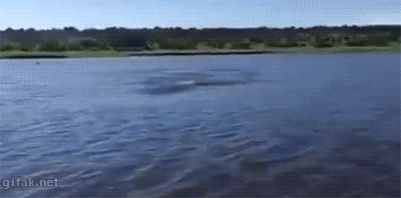What comes to mind first? Did you immediately know what was going on? Did you wonder how a centipede can walk like that? Did you even know that was a centipede?
At any time did you think "I don't know!" to any of those questions? If you did, that's entirely okay! There are MANY things we see and have no idea what is going on or what is happening. That's why we need to learn how to:
Make a claim
Make observations to find evidence
Explain our reasoning
Being able to see something and connect the dots in your brain with what you know and what you have learned or experienced takes practice. When we get really good at connecting those dots we go from "I don't know!" moments to "AHHAAA!" I get it.
Claim: The claim is a statement that answers your first question. For example:
You are riding in a boat and see the water swelling up behind you. Your brain tries to process what you are seeing. Suddenly you sit up and yell to everyone in the boat, "We are being followed by the Lochness Monster!"
Evidence: This is the data that you observed as you watch the water move toward you quickly. You can use qualitative statements like, there is something dark under that moving water. Or you could make a quantitative statement like, about 25 yards behind our boat is something that looks to be 50 feet long! The evidence must support what you see.
Reasoning: The reasoning is to explain why you made the claim and how do you know. So you could explain or reason quickly to the driver of the boat, "You better speed up the boat, the Lochness Monster or something really big is coming really fast toward our boat under the water!"
Your quick, logical thinking, or putting the dots together with what you know and have experienced about underwater Lochness Monster sightings makes the driver aware that something is following the boat. The driver may think, "What is that?"
Your quick scientific thinking or Claim-Evidence-and Reasoning helps save all the lives on the boat! At first glance, you didn't know what that was following you, but with a simple statement, with evidence and a strong reason why, your driver sped up the boat and everyone was glad! Did anyone care if it was the Lochness Monster? Not really, what they cared about was that something unknown was coming and you spotted it quickly.
When you first write CER's or Claim-Evidence-Reasonings you might not be very good at it. But we will practice doing this until your brain begins to "pop" whenever you see something interesting. The brain works super fast, faster than we can write Claim, Evidence, Reasoning. But, we need to get our brain "coded" to think that fast.
That's why we will be going in slo-mo for awhile...
The most important job you have is to keep at it, keep trying and don't quit!!




The dog's ears are so floppy.
ReplyDeleteQuitting is out of the question is my favorite.
ReplyDelete